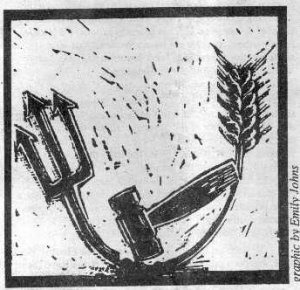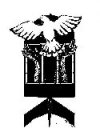
 |
| TRIDENT PLOUGHSHARES |
Popular support for disarming Britain's Trident nuclear submarine force continues to grow, particularly in Scotland, despite a High Court ruling there against the judgment of a local jurist who directed a jury to acquit three Trident Ploughshares women last year.
In mid-February, nearly a thousand people, most from Scotland, England
and Wales, but also from at least ten other countries, gathered at the
Faslane Peace Camp, opposite the home port of Britain's four-sub Trident
fleet. Among the participants in what organizers billed as The Big Blockade
were prominent members of the Scottish and European Parliaments, senior
clergy, and noted cultural figures. 
The Trident Ploughshares-initiated event lived up to its billing as the biggest ever at Faslane, when on February 12 at least 385 people were arrested during the largest anti-nuclear protest in Scotland since the Ban the Bomb movement in 1961. Even the sun came out to brighten the winter day as crowds of blockaders forced the base to close for the day, while handfuls of activists cut the fence and breached security. All but four were released within hours. Three people were released after a court appearance the next morning, and one Welsh student was jailed for a few days for an earlier unpaid fine.
A month later, following an International Women's Day weekend gathering at the Peace Camp, seven women cut through a fence and sprinted down a jetty to occupy a French warship docked at a fuel depot adjacent to the Faslane base. Three women managed to climb high onto the ship and lock themselves onto the superstructure. They were eventually removed by military police newly trained in climbing. The seven were released later in the day, charged with breach of the peace and, for the three who locked on, resisting arrest.
Towards the end of the March, anticipation grew for the impending response of the High Court of Scotland to the Lord Advocate's Reference of the acquittal of the Trident Three. Although Sheriff Margaret Gimblett's 1999 directed acquittal of Ellen Moxley, Ulla Roder and Angie Zelter could not be reversed, the High Court's answer to four legal questions related to the women's defense based on international law would set a precedent for upcoming Trident resistance trials in Scottish courts. A public opinion poll commissioned by the Scottish Campaign for Nuclear Disarmament (CND) showed that 51% supported the Big Blockade, and only 24% opposed it.
On March 26, Scottish resister Ian Thompson began his fifth jail sentence - seven days - for acting against Trident. "With respect to the Court," Thompson said, "I have to say that hell will freeze over before I pay" a fine for cutting the fence at Coulport, the nuclear weapons depot near Faslane.
When the three High Court judges faced a full gallery on March 30, the panel's chair, Lord Prosser, did not meet the eyes of the defendants as he summarized the 76-page text. The judges then quickly left the chamber. No wonder - the court spoke against all of the defendant's claims. Angie Zelter, in her initial response to the ruling, observed that "the Opinion is based upon the outrageous justification that threatening mass destruction is lawful in times of peace and only becomes unlawful in times of war when one knows the exact target..."
Trident Ploughshares released a statement the following day describing the ruling as "a shabby and incompetent piece of work, full of muddle and misrepresentation.
"A clear example of the lack of reasoning in the document is the
claim that the question of Trident's legality can only be considered in
time of war. Common sense demands that if we are concerned at all about
the legality of our weapons we examine that question as we prepare and
deploy them - not wait until it is too late. 
"The judgment completely ignores the submissions made on the basis of the Geneva Convention and the Nuremberg Principles. They have failed to answer the basic question: how could a 100 kiloton warhead ever be used against a military target without unlawfully affecting protected citizens?"
In a later analysis, Zelter also wrote, "Advice from lawyers around the world was that there was little chance that any High Court within a nuclear weapon state would be allowed to outlaw nuclear weapons however strong the arguments. But this did not put us off. We felt that however distorted the legal system was, the law is not just for the powerful but is for us all. We were not prepared to be so cynical that we would not even attempt the struggle.... We wished to reclaim the law from the abuse of the powerful and put it to its proper use - the protection and defense of the weak and powerless."
Gathered outside the Court to review the document, campaigners decided to return to Faslane on April 7.
Before departing Edinburgh, the Trident Three and nine supporters dramatically interrupted a crowded session of the Scottish Parliament on April 5, dropping a banner from the public gallery which read "COMPASSION, INTEGRITY, WISDOM = NO TRIDENT. WHERE'S THE JUSTICE?" quoting the words on the Parliament mace. Some of the activists shouted out: " The people of Scotland want rid of Trident. What will you do about it?" Others tied themselves to the barrier at the front of the public gallery.
Their action drew applause from some members of the Parliament and held up business for about 15 minutes before they were removed by police and taken to an Edinburgh police station, apart from one who was released immediately.
One of the activists, Barbara McGregor, from Glasgow, said: "As a Scot I am horrified that our highest court has said that threatening mass murder is okay. It's now up to Parliament and the Scottish people as a whole to show its revulsion for a state that practices terrorism and a dodgy legal system that backs it up."
Two days later the Three were among 150 campaigners at the Faslane gate. Sixteen people were arrested as activists cut through the fence.
The next Trident Ploughshares disarmament camp will take place at the Aldermaston Nuclear Weapons Establishment in the south of England, May 10-15. For more information, contact Trident Ploughshares, 42-46 Bethel St., Norwich, Norfolk, NR2 1NR, England; Tel: +44 1324 880744; email: tp2000@gn.apc.org web: www.gn.apc.org/tp2000 or www.tridentploughshares.org
